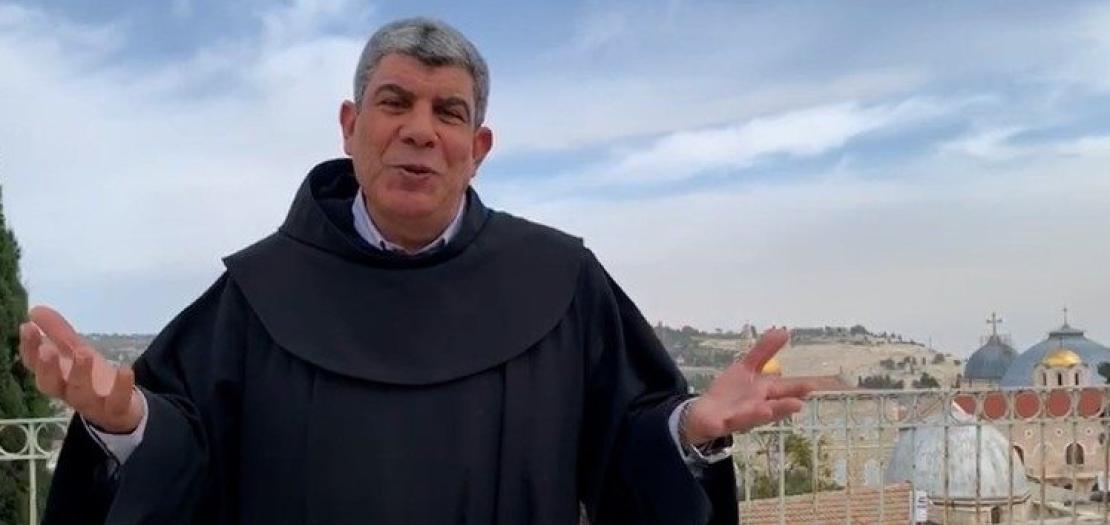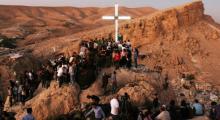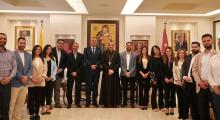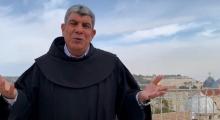Issued by the Catholic Center for Studies and Media - Jordan. Editor-in-chief Fr. Rif'at Bader - موقع أبونا abouna.org

The newly-resumed war in Gaza is increasingly marked by the staggering number of children killed.
In an interview with L’Osservatore Romano, Father Ibrahim Faltas, Vicar of the Custody of the Holy Land, explored the scars left on Gazan families and the Church’s efforts to support and shelter Gaza’s children as much as possible.
Q: Father Ibrahim, no other war has seen such a high percentage of child casualties. Can you help us understand why?
I believe it’s largely because families in Gaza are typically large, and the population is very young. Even though it's hard to pinpoint the exact reasons, I am deeply familiar with the pain of parents in Gaza who have lost a child—and often more than one. The killing of innocent children, who are blameless and incapable of causing harm, is a stain humanity will never be able to erase from its history.
The sheer number of children killed in Gaza is horrifying, and it's heartbreaking to think of the scars that so many of the survivors will carry—in their bodies, their hearts, and their minds—for the rest of their lives. The media reports less on the rising violence in the West Bank, where deaths, injuries, and arrests are also increasing. There, too, many of the victims are children.
Q: The figures from the Palestinian Ministry of Health are staggering: 15,613 children killed and 33,900 wounded since the war began. Among the dead are 876 newborns and 4,110 children under the age of five. There’s no data on the number of orphans. Do you have any information? How many children are believed to have lost their parents? Who is caring for them?
Estimates suggest that around 20,000 children have been orphaned. Sadly, that number may grow, since we don’t know how many bodies are still buried under the rubble. I’m told that, in many cases, older children are taking care of their younger siblings, assuming the responsibilities of an adult.
One of the great tragedies of this war is that we’re unable to help: humanitarian aid can’t get through, and only a few volunteers have been allowed into Gaza—and only recently. It’s devastating to be so close, yet so powerless.
Q: Last spring, you worked with the Italian government to arrange for more than 200 wounded or sick children from Gaza to receive medical treatment in Italian hospitals. You managed to get them out through Egypt. Do you think similar efforts could happen again?
Since late January 2024, more than 200 children have been welcomed by hospitals in Italy. Even in recent weeks, thanks to the temporary ceasefire, more children from Gaza have arrived via Egypt.
In November 2023, after a morning audience with the Holy Father, I visited our friends at the Bambino Gesù Hospital. Their generosity—as parents first, and then as doctors and administrators—opened the door to helping these little ones. The Italian government activated every possible diplomatic channel to make it happen. I will never stop thanking the Italian people for their generosity.
I know that other European countries have also taken in sick children from Gaza, and I hope more will follow. The list of children in need of treatment is very long, but getting them out is not easy. A truce—or better yet, an end to the war—could save the lives of children who are already so deeply scarred.
Q: You’ve personally assisted many of these children. Are there any particular stories that have stayed with you? Any especially moving cases you’d like to share?
Together with Italian Foreign Minister Antonio Tajani, I welcomed most of the children when they arrived in Italy. We had spoken about the children while waiting for them at the airport, but once we’d heard their stories from parents and guardians, we were left speechless.
Later, I visited them in hospitals and followed their recovery. I met one boy who arrived with severe leg injuries—I saw him walk again after a complex operation. A young girl battling cancer is now doing much better, though when she arrived, doctors warned me she was in critical condition.
In Italy, these children have received both medical care and love. Some are already speaking Italian. When they call me, I can finally hear peace in their voices—thanks be to God.
Q: In years past, you led a major initiative for the adoption of orphaned or abandoned Palestinian children in Italy, especially around San Marino and Umbria. Some of those children are now grown men and women. Do you remember any of them? Could a similar initiative be launched for Gaza’s children? Have you started any discussions in Italy?
Recently, we marked the 25th anniversary of the “Project Smile” initiative in San Marino. It was a project strongly desired by Archbishop Pietro Sambi, then Apostolic Delegate to Jerusalem, to whose memory I remain deeply attached.
The early 2000s were years of intense conflict in the Holy Land, and together we managed to build a real bridge of solidarity: many children from Bethlehem were adopted by families in San Marino. I’ve met them often over the years—they’re happy and well-loved. Later, it became impossible to continue the initiative in San Marino.
International adoptions have also become more difficult in Italy. But the need to place orphans in loving families—families that can offer them a future—is greater than ever. I wish I could help connect children without parents to people ready to welcome them and form beautiful families, always within the law and with full respect for child protection. So far, that hasn’t been possible. But we hope and pray.
Q: You’ve met with Pope Francis several times to speak about children. What has he said to you on the subject?
I last met the Holy Father on February 3, just ten days before his hospitalization at the Gemelli Hospital. Pope Francis had convened a summit on children, gathering leaders and institutions from around the world under the powerful title: “Let Us Love Them and Protect Them.” After the summit, he personally met with children who had come to Italy from war zones.
The children from Gaza told me they met a loving grandfather who looked at them with kind eyes. During his twelve years as Pope, I’ve had many opportunities to speak with him, and lately those moments have become more frequent. Every time, he asks about the situation in the Holy Land—how people are living, especially the children.
Pope Francis cares deeply about future generations. His vision of nurturing and protecting children comes through in everything he does: he is a father—watchful, just, and compassionate. He has always encouraged me in my work for children, especially when it comes to their education and the promotion of peace.
Q: Since the war resumed last Tuesday, the number of children killed has soared—130 on the first night alone. What news are you receiving from Gaza?
Sadly, the number has already risen, and unless the violence stops, it will keep going up. The news I’m getting from Gaza is deeply troubling. The resumption of fighting was both sudden and extremely violent.
This is a sacred time in the Holy Land: it’s Ramadan for Muslims and Lent for Christians. These are times when people usually respect each other’s rites, liturgies, and traditions.
Hearing of so much death and destruction during this season is especially agonizing. The deaths of innocent people are always profoundly painful.
Q: There is deep compassion here in Europe for what these children are going through. What can we do to support the vital work that you and others are doing in Palestine?
Around the world, people feel compassion and tenderness toward children. They sense the responsibility to protect their rights, their futures, their essential needs. What’s so shocking is that this sentiment seems entirely absent in those causing these children so much pain and death.
As Vicar of the Custody of the Holy Land, which for over 800 years has safeguarded the Holy Places and the living stones who inhabit them, I can say that we offer work, education, housing, and support in many forms. In recent years, we’ve faced even greater challenges due to war, ongoing tensions, and the pandemic. Our efforts are sustained by Providence and by the generosity of benefactors, who help us serve the children and the Holy Land.
I hope that this year’s Good Friday Collection for the Holy Land will be even more generous than in the past. Above all, we rely on the prayers of all people—so that the precious gift of peace may soon reach children everywhere. May the Holy Child of Bethlehem protect them, strengthen them, and guard their smiles.







